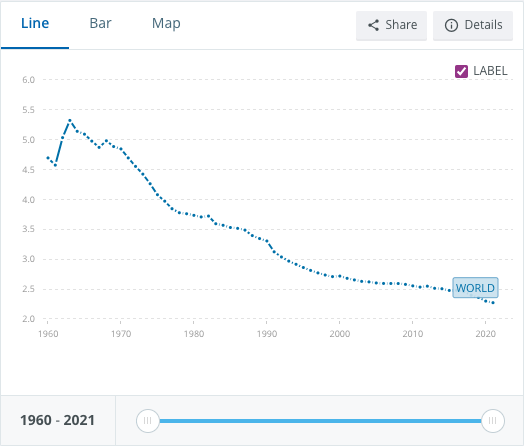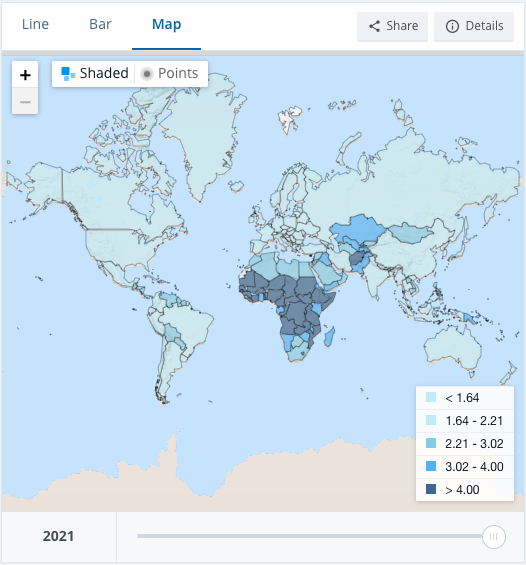

Since the 1960/70's academia, politicians as well as news media outlets have been emphasizing decreasing the world population because our population was growing so fast and great, thanks to the green revolution of higher agricultural yields; thus they believed the population was going to outstrip all our resources, e.g. forests, fresh water, etc; and lead to total desertification to the point where total collapse in the food supply and widespread famine would occur and rightly so. And they did have good reason, because from 1950 to about 2014, the world population tripled from 2.5 billion to 7.5 billion. But history shows that the green revolution spread throughout the world and to different crops and prevented mass starvation by the late 20th century, so that there was less starvation in the 1990s and even now than in the 1960's. And it seems to my suprise, many students are still being taught this, and traumatized, resulting in mental problems such as depression and anxiety; without the proceeding facts outlined below, which I gleaned from the Worldbank, OECD, Global Data, Worldometers and earth.com. So relax and read on.
However these alarms, policies and changes were so successful that they have started to take effect. In fact a little too well as we are now plateauing at 8.1 / 8.2 billion (only increasing in the double digit millions annually, and soon the single digit millions3, which is tiny compared to over 8 billion people.) Thus at a double digit rate like 81 million, that's just 1% growth, while at a single digit million, say for example 8 million / year growth, that's 1/10th of a % at only .1%. However that's just temporary because in looking at the most populous countries, a big surprise is realized. As in a roller coaster ride that has been going up, up, reaching the zenith where we can see below and how steep that drop will depend on our policies going forward.

Therefore we actually have population implosions going on in many regions like North America, Europe, our Asian and middle eastern allies e.g., Japan (Israel is the exception) and even our "frenemy" China (who discarded the 1 child policy in 2016). If it wasn't for the open borders we would be imploding instead of expanding in the USA and Europe. And according to the OECD, a country must maintain at least 2.1 births per woman just to maintain it's population (or put another way a figure known as replacement level fertility – "a total fertility rate of 2,100 live births per 1,000 women – is needed to maintain the current U.S. population" (as well as any other country)5. Here are some figures from the Worldbank1, Globaldata3 and Worldometers6:
Now when you look at 20 of the most populous countries in the world, you see something very different if not alarming. Below in millions 3 1 6 as currently as last year, 2023:
| Country | Population in Millions | Birth Rate |
| #1 India | 1428.6 | 2.0 (2.05 - 2020) |
| #2. China | 1425.6 | 1.2 |
| #3 USA | 339.9 | 1.7 |
| #4 Indonesia | 277.5 | 2.1 (2.19 - 2020) |
| #5 Pakistan | 240.4 | 3.3 (3.56 - 2020) |
| #6 Nigeria | 223.8 | 5.1 (5.31 - 2020) | #7 Brazil | 216.4 | 1.6 |
| #8 Bangladesh | 172.9 | 1.9 |
| #9 Russia | 144.4 | 1.5 |
| #10 Mexico | 128.4 | 1.8 |
| #11 Ethiopia. | 126.5 | 4.0 (4.24 - 2020) |
| #12 Japan. | 123.2 | 1.3 |
| #13 Philippines. | 117.3. | 2.7 (2.78 - 2020) |
| #14 Egypt | 112.7. | 2.8 (2.96 - 2020) |
| #15 DR Congo. | 102.2. | 6.1 (6.21 - 2020) |
| #16 Vietnam. | 98.8. | 1.9 |
| #17 Iran | 89.1. | 1.7 |
| #18 Turkey | 85.8. | 1.9 |
| #19 Germany. | 83.2. | 1.5 |
| #20 Thailand. | 71.8. | 1.3 |

To paraphrase Roman: South Korea: The Latest Fertility rate .7% (ave korean woman having 0.72% kids) for every 100 koreans today they leave behind only 4 great grandkids, the offspring, will be reduced by 96%. The math, out of 100 Korean people (which is on ave 50 men, 50 women or 50 couples based on that rate they will only have 36 kids, who will have 18 couples and have 12 kids, which make 6 couples which will have 4 kids which is a 96% pop drop within the next 3 generations which is why gov't floating mass migration will create new problems.7
Some countries have taken a more common sense approach; for instance Hungary with a 1.6 birth rate changed their tax laws to allow families with 3 kids or more not to be charged income tax, how sweet. Maybe more countries can do that to keep their population from totally imploding, especially here at home.
While decreasing our population may be a good idea, from an environmental and economic standpoint, doing it too fast is a bad idea, because many important essential jobs would go unfilled causing multiple crises: hardships and severe supply chain problems that could lead to shortages of food, medicine, and personnel like first responders, medical professionals, firemen/women, police officers, farmers, etc.
(1) https://data.worldbank.org/indicator/SP.DYN.TFRT.IN
(2) https://data.oecd.org/pop/fertility-rates.htm
(3) https://www.globaldata.com/data-insights/macroeconomic/most-populated-countries-in-the-world/
(4) https://www.worldometers.info/world-population/#:~:text=The%20World%20Population%20in%202023,the%20world%20population%20was%207%2C909%2C295%2C151.
(5) https://www.earth.com/news/cdc-total-fertility-rate/
(6) https://www.worldometers.info/world-population/population-by-country/
(7)https://www.youtube.com/shorts/pTmcssubgVI
(8) https://rajawali.hks.harvard.edu/articles/a-rapidly-aging-world-and-the-awaiting-demographic-implosion/
By Chief Editor Angelo-Lk-Whatcom-Rider-Writer, Updated: 4-2-2025
About The writer: I've lived in Bellingham since February, 2011, and love the beautiful trees & greenery producing all that oxygen, and of course, the lake, bay, hills and mountains too. I've also been in the lovely Anacortes area for part of that time, going back and forth, since moving here.
Educational/Professional Background: Economics & Political Science Degrees at UCF. Attended Graduate School of Economics at FSU, and have worked for the FL Labor Dept as well as consulted for the FL Labor Dept on behalf of the US Labor Dept. I've been happily working in my own businesses since 1993.